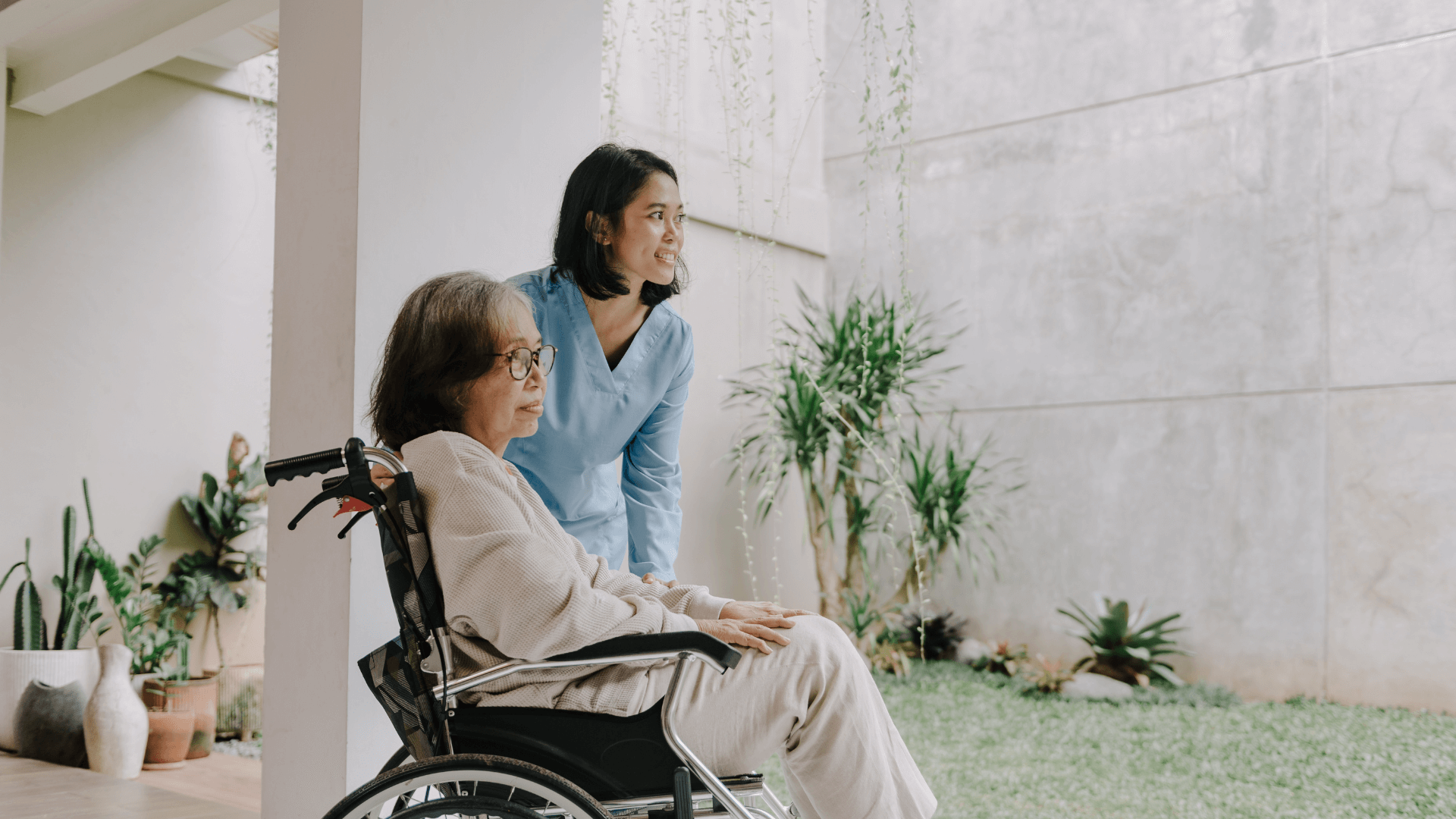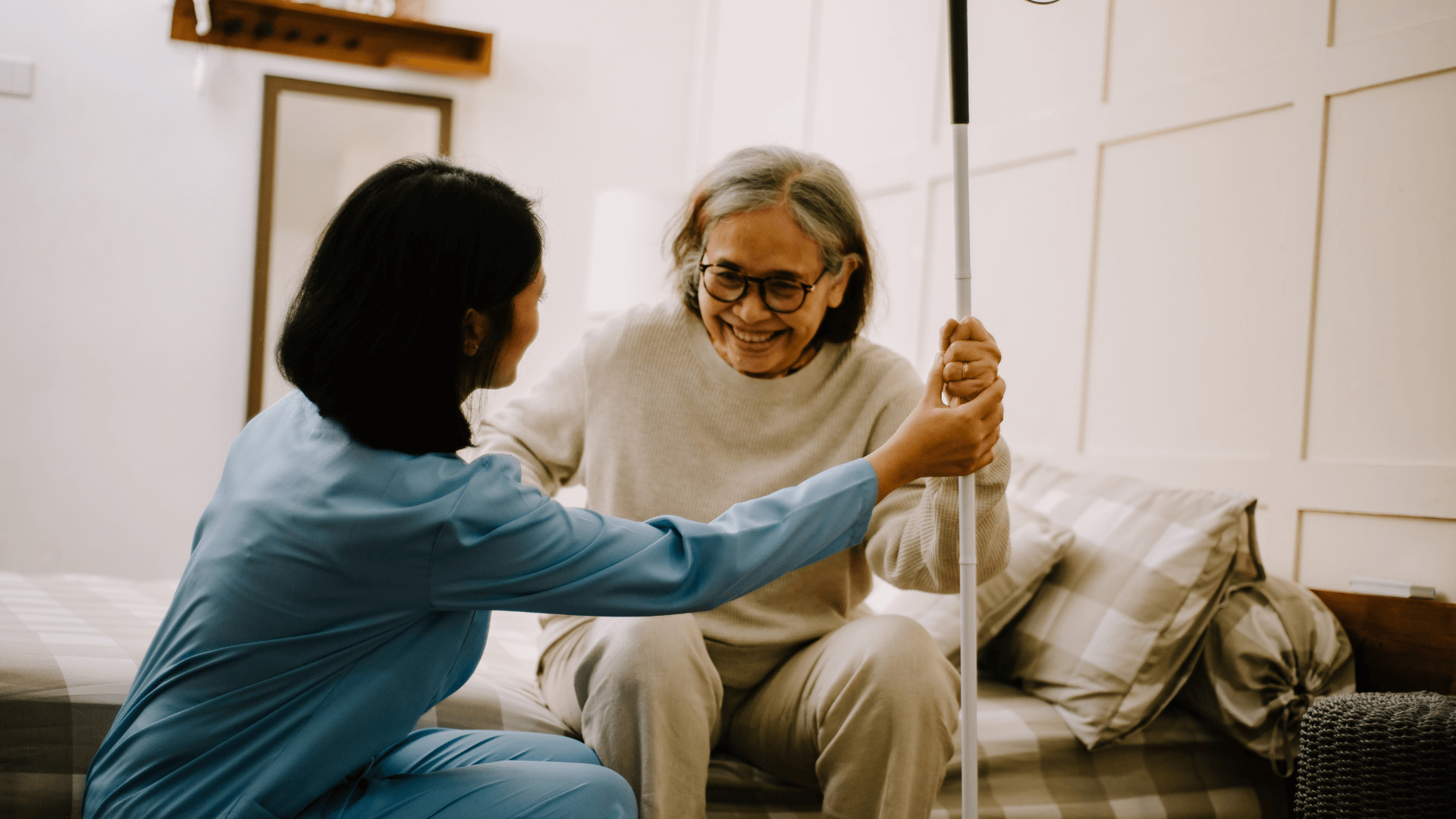Post-Hospital Care and Rehab Services in Singapore for Expats
Recovering from a hospital stay doesn’t end at discharge, especially for expats in Singapore navigating an unfamiliar system. Post-hospital care and rehabilitation play a crucial role in the long-term recovery and overall quality of life after surgery, illness, or injury.
What kind of follow-up care will you need? Can you continue recovery at home, or is professional support required? How do you find trustworthy providers, and will your insurance cover it?
In this Pacific Prime CXA article, we explore the post-hospital and rehabilitation services available to expats in Singapore, covering types of care, service providers, typical costs, and how to ensure your insurance plan supports a smooth recovery journey.
What Is Post-Hospital Care?

Once discharged, patients often need structured support to continue healing. Post-hospital care includes medical and non-medical services that help with recovery, prevent complications, and support day-to-day needs.
Short-Term Rehabilitation
This includes physiotherapy, occupational therapy, or speech therapy to regain mobility, coordination, and independence. It’s common after surgery, injury, or stroke, and may take place in clinics, hospitals, or at home.
Chronic Care Management
For those with long-term conditions, such as diabetes or heart disease, ongoing care is essential. Services focus on medication management, symptom monitoring, and helping patients maintain stability and quality of life.
Home Support Services
Home care allows patients to recover in a familiar setting. This may include nursing visits, help with hygiene, wound care, and mobility support. Home-based therapy is also an option for those unable to travel to rehab centers.
Common Types of Rehabilitation Services in Singapore
Rehabilitation in Singapore supports recovery from illness, injury, or surgery. Services are available at hospitals, private clinics, and through home care, making it easier for expats to access the right treatment after hospital discharge.
In this section, we break down the main types of rehabilitation services available to expats, outlining what each involves and when they’re typically recommended during the recovery process.
Physical Therapy
Physical therapy targets muscle strength, flexibility, balance, and pain relief. It is commonly prescribed after orthopedic surgeries, strokes, or prolonged bed rest to help restore physical independence and prevent long-term mobility issues. Typical cases include:
- Orthopedic surgery (e.g. hip/knee replacement)
- Stroke or spinal cord injuries
- Chronic pain and mobility issues
Occupational Therapy
Occupational therapy helps patients return to everyday tasks after injury, illness, or surgery. It supports independence in daily routines, especially for those dealing with neurological conditions or post-operative impairments. Common focus areas include:
- Dressing, bathing, or cooking
- Using tools or work equipment
- Navigating daily routines post-discharge
Speech and Language Therapy
This therapy supports those recovering from conditions affecting speech, communication, or swallowing. It’s often needed after a stroke, brain injury, or surgery involving the head and neck, and may include cognitive therapy as well. Patients usually work on:
- Regaining speech clarity and expression
- Managing dysphagia (swallowing difficulty)
- Improving memory and communication
Cardiac and Pulmonary Rehabilitation
These programs assist recovery from heart surgery, heart attacks, or chronic lung diseases. They focus on safe physical reconditioning, patient education, and long-term health management in a monitored setting. Key components include:
- Supervised aerobic and strength training
- Lifestyle coaching and nutrition planning
- Ongoing monitoring by rehab physicians
Home-based Care Services for Expats Living in Singapore
Recovering at home with professional support is an increasingly popular choice for expats in Singapore. Home-based care covers medical and personal services that help patients heal comfortably in familiar surroundings, reducing stress and promoting better outcomes.
In this section, we explore key home care services and why expats often prefer them over facility-based rehab.
Home Nursing and Caregiving
Home nursing delivers essential medical services such as wound care, medication administration, and regular health monitoring. This ensures ongoing clinical support outside the hospital setting, which is crucial for complex recoveries.
Caregivers assist with everyday activities like bathing, dressing, meal preparation, and mobility. Their support helps patients maintain independence and quality of life during recovery.
In-Home Physiotherapy and Rehabilitation
Physiotherapy at home offers tailored exercise programs, manual therapies, and pain management to aid recovery. This approach provides convenience and reduces the need for travel, particularly beneficial for patients with limited mobility.
Home rehab therapists also work closely with patients and families to adapt therapy plans according to progress. This personalized attention can improve outcomes and patient satisfaction.
Benefits for Expats
Home-based care providers often offer multilingual support and cultural sensitivity, making communication easier for expats in Singapore. This helps reduce stress and ensures a clear understanding of treatment plans and progress.
The privacy and comfort of home care, combined with flexible scheduling, fit well with busy expat lifestyles. This option allows recovery without interrupting work or family commitments.
Rehabilitation Facilities and Clinics for Expats Living in Singapore
Rehabilitation facilities in Singapore range from public hospital departments to private clinics and specialized centers. These provide structured programs for patients needing more intensive or long-term therapy following hospital discharge.
Expats can choose between public options with government subsidies or private providers offering personalized care and shorter wait times.
Public Hospital Rehabilitation Departments
Public hospitals offer comprehensive rehab services, often subsidized for eligible patients. Key public hospitals with dedicated rehab departments include:
Private Rehabilitation Clinics and Centers
Private clinics deliver flexible rehab therapies with multilingual staff and faster access to specialists. Leading private hospitals serving expats include:
Specialized Rehab Facilities
Specialized centers focus on areas like neurorehabilitation, cardiac rehab, and pediatric therapy. They combine advanced technology with multidisciplinary teams to handle complex cases.
Examples include:
Insurance Coverage for Post-Hospital Care in Singapore
Post-hospital care in Singapore can become costly without the right insurance. While inpatient treatments are often well-covered, outpatient rehab and home services may fall into coverage gaps, leaving expats vulnerable to unexpected expenses.
What’s Commonly Covered
Most comprehensive health insurance plans include some level of outpatient rehabilitation, such as physiotherapy and occupational therapy. However, coverage is often limited by:
- Number of sessions allowed per year
- Dollar caps per visit or condition
- Approved provider networks only
Home nursing and in-home therapy may also be included, but usually under more premium international plans.
What Might Be Excluded
Many basic or employer-provided policies exclude certain services or impose strict limitations. Common exclusions include:
- Long-term home caregiving or daily personal care
- Speech therapy or cognitive rehab for neurological issues
- Non-medical services like transport or meal assistance
Pacific Prime CXA helps expats find international health insurance plans that support post-hospital recovery, including outpatient rehab and home care. We simplify the process, compare options, and guide you toward coverage that fits your long-term needs.
Cost of Rehabilitation and Post-Hospital Services in Singapore
Costs for post-hospital care in Singapore can vary widely depending on the type of service, duration, and whether you choose public or private care. Understanding the price differences helps expats plan and manage long-term expenses more effectively.
In this section, we break down typical costs for common rehab services, compare public vs private fees, and explore ways to manage these expenses as an expat in Singapore.
Common Rehab and Home Care Costs
Outpatient physiotherapy can cost between SGD $80–$200 per session at private clinics. More complex therapies like speech or cardiac rehab can cost even more, especially in hospital settings or when provided in-home by a specialist.
Home nursing services start around SGD $100 per visit, but can increase with the complexity of care. Long-term packages or daily care assistance can range from SGD $2,000–$5,000 per month, depending on the provider and frequency.
Public vs Private Sector Pricing
Public hospitals offer subsidized rehab rates for PRs and citizens, but expats often pay full fees. Wait times and appointment slots may also be limited in public settings, which can impact recovery timelines for those with urgent needs.
Private rehab centers charge higher rates but offer quicker access, flexible scheduling, and often more personalized care. For expats seeking comfort and speed, private care is typically the preferred choice.
Financial Planning Tips
To manage long-term rehab costs, expats should review their insurance policies to confirm outpatient coverage, visit caps, and approved providers. Those without coverage may want to consider upgrading to a plan that includes comprehensive rehab benefits.
Some rehab centers offer package rates or bundled sessions at a lower cost. Planning early and working with a broker can also help identify providers within budget and optimize your recovery support.
Tips for Expats Navigating Post-Hospital Recovery
After discharge, many expats struggle with finding the right providers, understanding local care systems, and managing follow-up treatments. These tips can help you navigate post-hospital recovery in Singapore with greater clarity and confidence.
Finding the Right Providers
Start by checking with your hospital discharge team or primary physician for referrals to licensed therapists or home care services. Trusted names often work within hospital networks and may also be covered by your insurance.
You can also consult your insurer’s provider directory or use a broker like Pacific Prime CXA to match your needs with reputable outpatient clinics, home nursing agencies, or specialized rehab centers near you.
Coordinating Follow-up Care
Aftercare plans often include rehab sessions, medication, or lifestyle adjustments. Make sure you understand your discharge summary, follow-up appointments, and required documentation—especially for insurance claims or future medical reviews.
Keep track of your appointments, prescriptions, and care instructions in one place. If language or system navigation is an issue, a care coordinator or medical concierge can help simplify the process.
The Role of Brokers and Coordinators
Insurance brokers don’t just help with plan selection—they also offer claims guidance, provider recommendations, and policy reviews. This can be especially helpful when transitioning from hospital to home-based or outpatient care.
Pacific Prime CXA supports clients by connecting them with insurers that offer strong post-hospital benefits. We also help resolve claims issues and guide clients through recovery-related paperwork and coverage terms.
How Pacific Prime CXA Can Help You

Getting discharged from the hospital is just the beginning. Proper post-hospital care is key to a smooth and full recovery. With the right support, expats in Singapore can access quality rehab services, manage costs, and get back to daily life with confidence.
International health insurance plans often provide broader coverage for rehabilitation and home care than basic or employer-provided policies. With expert guidance, you can find a plan that fits your recovery needs and avoids unexpected out-of-pocket costs.
With over 25 years of experience, Pacific Prime CXA helps expats compare plans, clarify coverage, and connect with trusted care providers. Whether you’re planning ahead or already in recovery, we’re here to simplify the process and support your health journey.
Contact us today to get started, or get a free quote to explore your options with confidence.
Frequently Asked Questions
Can expats use public rehabilitation services in Singapore, or are they only for citizens and permanent residents?
While public rehab services prioritize citizens and permanent residents with subsidies, expats can access these services, but typically at full fees. Waiting times may also be longer. Many expats prefer private rehab centers for faster access and tailored care.
Are rehabilitation therapies covered under international health insurance?
Coverage varies by plan, but many comprehensive international health insurance policies include outpatient rehab therapies. It’s important to check session limits, coverage caps, and approved providers to avoid unexpected costs during recovery.
How can expats find home care providers who speak their language or understand their cultural needs?
Many home care agencies in Singapore offer multilingual staff and cater to diverse cultural backgrounds. Expats can ask their insurance broker or hospital discharge team for recommendations to find culturally sensitive home-based care providers.


